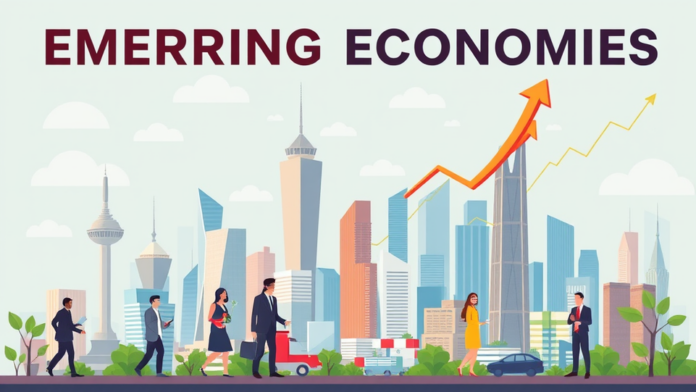Introduction to Emerging Economies
Definition and Characteristics
Emerging economies are nations experiencing rapid growth and industrialization. These countries often exhibit significant potential for investment due to their expanding markets. He notes that they typically have lower income levels compared to developed nations. However, their economic indicators show promising trends. Investors are drawn to these markets for higher returns. This can be a lucrative opportunity. Additionally, emerging economies often face unique challenges, such as political instability and regulatory hurdles. Understanding these factors is crucial for informed investment decisions. Knowledge is power in finance.
Importance in the Global Economy
Emerging economies play a pivotal role in the global economy. They contribute significantly to global GDP growth. This growth is often driven by factors such as increased consumer demand and foreign investment. Key characteristics include:
These elements create a dynamic market environment. Investors are increasingly recognizing these opportunities. This can lead to substantial returns. Moreover, emerging economies often serve as a buffer against global economic downturns. Diversification is essential for risk management.
Current Trends in Emerging Markets
Economic Growth Rates
Emerging markets are experiencing robust economic growth rates. Many countries are projected to grow faster than developed economies. This trend is driven by factors such as urbanization and technological adoption. Increased investment in infrastructure supports this growth. He observes that these elements enhance productivity. Additionally, favorable demographics contribute to a growing labor force. This can lead to higher consumption levels. Understanding these dynamics is crucial for investors. Knowledge is essential for making informed decisions.
Technological Advancements
Technological advancements are reshaping emerging markets significantly. Innovations in mobile technology and internet access drive economic growth. He notes that these developments enhance communication and efficiency. Increased connectivity allows businesses to reach broader markets. This can lead to higher revenue streams. Moreover, advancements in fintech are revolutionizing financial services. They provide greater access to capital for small enterprises. Understanding these trends is vital for strategic investment. Knowledge is key in navigating these changes.
Investment Opportunities in Emerging Economies
Sector-Specific Opportunities
Emerging economies present various sector-specific investment opportunities. The technology sector is rapidly expanding, driven by innovation. He believes this growth is sustainable. Renewable energy is another promising area, as countries seek to reduce carbon footprints. This shift creates demand for clean energy solutions. Additionally, the healthcare sector is evolving, with increasing investments in infrastructure and services. This can improve overall public health. Understanding these sectors is crucial for informed investment decisions. Knowledge is essential for success.
Geographic Hotspots for Investment
Several geographic hotspots are emerging as attractive investment destinations. Southeast Asia, particularly Vietnam and Indonesia, shows rapid economic growth. This growth is fueled by a young population and increasing foreign investment. He notes that these factors create a favorable business environment. Additionally, Africa presents unique opportunities, especially in technology and agriculture. Countries like Kenya and Nigeria are leading in innovation. Latin America, particularly Brazil and Mexico, also offers potential in various sectors. Understanding these regions is essential for strategic investment.
Challenges Faced by Investors
Political and Economic Instability
Political and economic instability poses significant challenges for investors. Unpredictable government policies can disrupt market conditions. He observes that this uncertainty often leads to increased risk. Additionally, currency fluctuations can impact investment returns. This volatility complicates financial planning. Furthermore, social unrest may hinder business operations and deter foreign investment. Understanding these risks is crucial for effective decision-making. Knowledge is essential for navigating these complexities.
Regulatory and Compliance Issues
Regulatory and colpliance issues present significant hurdles for investors. Navigating complex legal frameworks can be challenging. He notes that inconsistent regulations may vary widely between countries. This inconsistency complicates investment strategies and increases operational costs. Additionally, compliance with local laws often requires substantial resources. This can strain smaller enterprises disproportionately. Furthermore, failure to comply can result in severe penalties. Understanding these regulations is essential for risk management. Knowledge is crucial for successful investments.
Strategies for Successful Investment
Diversification and Risk Management
Diversification and risk management are essential strategies for successful investment. By spreading investments across various asset classes, he reduces exposure to any single risk. This approach can include equities, bonds, and real estate. Each asset class behaves differently under market conditions. Additionally, geographic diversification can mitigate regional risks. He emphasizes the importance of regular portfolio reviews. This ensures alignment with changing market dynamics. Understanding these strategies is vital for long-term success. Knowledge is key in investment management.
Local Partnerships and Insights
Local partnerships and insights are crucial for successful investment strategies. Collaborating with local firms provides valuable market knowledge. He believes this can enhance decision-making processes. Local partners understand cultural nuances and regulatory landscapes. This knowledge can mitigate risks associated with unfamiliar markets. Additionally, leveraging local networks can facilitate smoother operations. He emphasizes the importance of building trust in these relationships. Strong partnerships can lead to better opportunities. Knowledge is essential for navigating complexities.
Future Outlook for Emerging Economies
Predicted Economic Trends
Predicted economic trends indicate robust growth in emerging economies. Analysts expect increased foreign direct investment to drive this expansion. He notes that technological advancements will play a significant role. These innovations can enhance productivity and efficiency. Additionally, demographic shifts will create a larger consumer base. This growth in consumption can stimulate various sectors. Furthermore, sustainability initiatives are likely to gain traction. Understanding these trends is essential for strategic planning. Knowledge is vital for future investments.
Long-term Investment Considerations
Long-term investment considerations in emerging economies require careful analysis. He emphasizes the importance of understanding market dynamics. Economic stability and growth potential are critical factors. These elements can influence investment returns significantly. Additionally, investors should assess political risks and regulatory environments. This awareness can mitigate potential losses. Furthermore, sustainability practices are becoming increasingly relevant. They can enhance long-term viability. Knowledge is essential for informed decisions.

